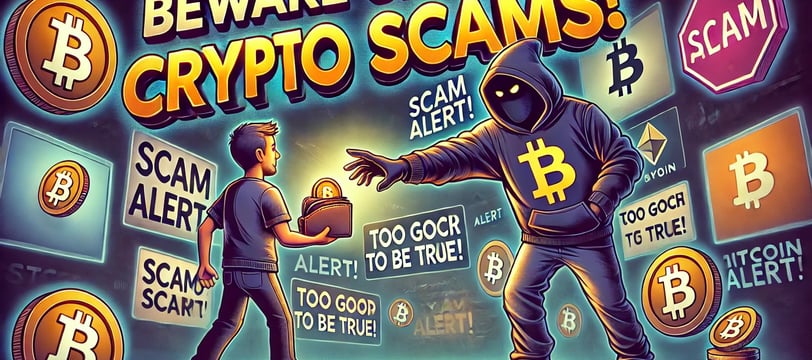Beware of Crypto Scams
Crypto is full of opportunities, but also plenty of sneaky scams waiting to snatch your hard-earned coins. From fake influencers and phishing attacks to rug pulls, airdrop traps, and even tampered hardware wallets—scammers are getting craftier by the day. In this ultimate guide, we break down the biggest crypto scams, how they work, and, most importantly, how to avoid them like a pro. Stay safe, stay smart, and keep your crypto where it belongs—in YOUR wallet!
4 min read


The Ultimate Guide to Crypto Scams: How to Spot and Avoid Them
Alright, frens! Welcome to the thrilling yet sometimes shady world of crypto! It’s a bit like the Wild West—full of opportunities, but also loaded with bandits trying to steal your gold (or in this case, your Bitcoin). But fear not! I’m here to help you dodge these digital desperados and keep your crypto safe. Let’s break down the biggest scams lurking out there and how to steer clear of them.
1. Impersonation Scams
The "Fake Influencer" Hustle
Ever see a tweet from Elon Musk promising to double your Bitcoin? Yeah, that’s a scam. Scammers create fake profiles of big names in crypto, pretending to offer insane deals or "urgent support."
How to Dodge It:
If it sounds too good to be true, it is.
Only trust official accounts (check for that verified badge!).
Never DM your details to some “support rep” who messaged you first.
2. Phishing Attacks
Dodgy Links & Emails
You get an email: "Urgent! Your Binance account has been compromised! Click here to fix it!" One click, and boom—your login details are stolen. Classic phishing attack.
How to Avoid:
Never click on sketchy links in emails or DMs.
Double-check website URLs before entering any credentials (is that a zero instead of an "o"?).
Use a password manager—it’ll tell you if the URL is fake.
3. Giveaway Scams
"Send 1 BTC, Get 2 BTC Back!"
Nope, you won’t. Giveaway scams are everywhere. Scammers pretend to be big companies or influencers and claim they’ll send you double your crypto if you send them some first. Spoiler alert: you won’t get anything back.
How to Stay Safe:
No one is handing out free crypto—especially not to random strangers on Twitter.
If a giveaway is legit, check the official website, not some random post.
Keep your crypto where it belongs—in your own wallet.
4. Airdrop Scams
"Free Tokens! Just Connect Your Wallet!"
You get a message claiming you've won free tokens in an airdrop. All you have to do is connect your wallet to a website. Sounds amazing, right? Wrong! These fake airdrops often require you to sign a malicious smart contract that drains your funds.
How to Stay Safe:
Only trust airdrops from verified, reputable projects.
Never connect your wallet to random sites just for “free” tokens.
Check the project’s official website and social media before engaging.
5. Rug Pulls & Pump-and-Dump Schemes
The "Get Rich Quick" Token Scam
A new crypto project pops up, promising 1000x returns. The devs hype it up, influencers push it, people FOMO in... and then the team vanishes, taking all the money with them. That’s a rug pull.
Avoiding the Trap:
Research the team—if they’re anonymous, that's a red flag.
No audits? No thanks.
If the token's price skyrockets for no reason, be suspicious.
6. Fake Customer Support & Help Scams
"Hi, I'm from Binance Support!"
You ask a question in a Telegram group, and suddenly, a "Binance Support Rep" DMs you, offering help. They’ll then ask for your seed phrase. And poof—your funds are gone.
Protect Yourself:
Real support won’t DM you first—ever.
Never share your private keys or passwords. Not even with “real support.”
If you need help, go directly to the official website’s support section.
7. Ponzi & Pyramid Schemes
"Earn 10% Daily Returns!"
If someone promises guaranteed profits, run the other way. Ponzi schemes use new investors' money to pay earlier ones—until the whole thing collapses.
How to Spot It:
Anything promising “risk-free” returns is a scam.
If the money comes from recruiting others, it's a pyramid scheme.
Real investments go up and down. If it only "goes up," it's fake.
8. Malware & Keyloggers
The "Infected Wallet" Scam
Clicking the wrong link or downloading a fake wallet can infect your device, letting hackers steal your crypto keys.
How to Stay Safe:
Only download wallets from official sources.
Keep your software updated and use antivirus tools.
Avoid browser extensions that promise to “boost” your crypto experience.
9. NFT & Smart Contract Scams
The "Fake Marketplace" Trick
You think you’re buying a hot NFT, but actually, you’re interacting with a scam contract that drains your wallet.
Avoiding This Nightmare:
Only buy NFTs from official marketplaces like OpenSea.
Always double-check the contract before signing transactions.
If it asks for "unlimited access" to your wallet, decline!
10. Hardware & Software Wallet Scams
Fake Wallets & Tampered Devices
Some scammers sell compromised hardware wallets or create fake software wallets to steal your funds.
How to Avoid:
Only buy hardware wallets from official websites—avoid secondhand purchases – no Amazon or E-Bay.
Set up the device yourself and ensure it asks you to generate a new seed phrase.
Be wary of software wallets from unverified sources.
Never enter your seed phrase into an online form or app.
Final Tips for Staying Safe in Crypto
Never, ever, EVER share your private keys or seed phrases. You would need them only to restore your old account in a new wallet. Period.
Use a hardware wallet for long-term storage.
Double-check wallet addresses before sending transactions.
Be skeptical of unsolicited messages, emails, and "too-good-to-be-true" deals.
DYOR (Do Your Own Research) before investing in anything.
Turn on multi-factor authentication (MFA) on all your accounts.
Crypto is amazing, but it's also filled with bad actors looking to take advantage of the uninformed. Stay sharp, question everything, and remember: if it sounds too good to be true—it is! Stay safe and happy hodling




